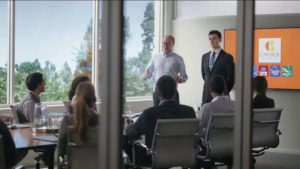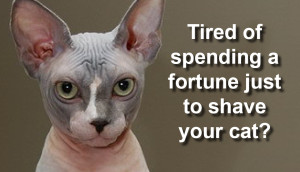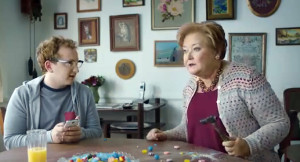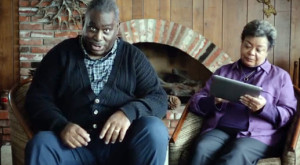Meta-Meta-Advertising

Badda-book, badda-boom? Really? This fingernails-on-a-blackboard tagline has been interrupting shows, games, movies, and news broadcasts for a couple of years now. Could it be the worst ad campaign of the decade?
One mark of a bad ad is that you can’t recall the advertiser. With this one, though I’ve seen these spots hundreds of times, I had to look up its name before I started writing this blog because I still couldn’t remember the sponsor. I had just assumed it was one more of those innumerable online travel booking engines (like Orbitz, Expedia, Priceline, Booking.com, etc.). No, it’s a Maryland-based hospitality holding corporation representing a portfolio of hotel chains. I’m not going to tell you the name or the names of the chains it owns. That’s the ad campaign’s job. At which it fails miserably.
Indeed, the latest iteration of the campaign, called “Glow,” features yet another meeting of the ad agency and the client. What an engaging concept! The spot begins as two account executives brag about the success of last year’s ad campaign and present a commercial to “take it up a notch,” letting us know right away that this is an ad about advertising. The commercial-within-a-commercial (an inframercial?) shows a glow around two slo-mo walking customers after they’ve checked into the hotel. These radioactive customers block the logo behind them, teasingly, so we can’t see the brand. The presenter says he assumes that viewers would think they too would glow when they checked in. Then the campaign’s spokesman, who, we gather, is supposed to be the CEO of the company (a white male, naturally) says, “Who glows? Just say ‘Badda-book. Badda-boom.'” Whereupon his sycophant, who is in most of these spots, smirks and says, “Nobody glows!” The CEO gestures at him approvingly, “He gets it” and throws him a treat. (This last part I made up, but the whole thing is just sickening.)
The real-world ad agency that came up with this campaign (McCann Erickson NY) seems to think their job is to inform the public how they come up with these clever ideas, and to make the ad all about how brilliant their tagline is. That comes through loud and clear, unlike any product benefit. Or the name of the brand.
But the tagline they are so proud of is meaningless. It’s a flaccid riff on a mid-20th century rolling gag (bada-bing, bada-boom) made popular on the 1950s Jackie Gleason Show and by generations of gangster movies and TV series ever since. From what I can understand, the tagline is supposed to remind us that travel (or, at least hotel reservations) is easy to book online. Just like every other hotel or online travel booking service. Whaaaaa!? You mean I can make reservations on this new thing called “The Interwebs” now? I’m sorry, I’ve been trapped in a mine for the past forty years, living on blind cave-crickets, and didn’t know that. What a brave, new world we live in. What’s next? Microwavable popcorn?
Ad Narcissism
Watching this campaign, I get the impression that the people at McCann are mighty pleased with themselves. So much so that they have to keep feeding us these spots that advertise the advertising. So it’s meta-advertising. And now in this year’s campaign, with straw-man spots nested within the spots, as if to ask, “Aren’t you glad we didn’t make you watch these dull concepts?” they’re meta-meta-advertising. Like a matryoshka doll of inanity.
To be fair, by itself, badda-book-etc. is not the worst tagline ever written. In fact, if it were paired with clever scripts, it could be an effective tail. But the tail is wagging this dog. All of the spots are just about it and how perfect it is. They are ads for the tagline, not for the hotel…or whatever it is. Which makes it advertising narcissism. Ad nauseam.
The campaign, in spot after spot, breaks a cardinal rule of advertising. It hides the customer benefit. In this and previous spots, if you stay in your seat long enough to wait for the logo and the final line, they do mention something about the chain having the lowest prices (itself a very weak and unsubstantiated position, but at least a customer benefit), but that comes out of nowhere and has nothing to do with the badda-book slogan. If they were going to seed that position in our awareness, they would have generated concepts reinforcing cheapness. But they didn’t, because badda-book badda-boom is just so cheek-pinchingly adorable. So let’s make the whole campaign about that. Jackie Gleason is beaming from the grave.
The other cardinal rule the campaign breaks is: Don’t talk about yourself, talk about what you can do for the viewer. The audience doesn’t care what you think of yourself, what JD Power Awards you’ve won, how great you think you are, what your passion is. If they’re going to stick around at all, tell them what you can do for them. But this campaign breaks that rule in spades, because it not only doesn’t talk about what it can do for the customer, it doesn’t even talk about the client; it talks about how great the tagline is That’s badda-dumb.




